In the same section
Shaping the Future of Higher Education: The Transformative Digital Pedagogies for Higher Education (TDP4HE) project
Authors:Kakoulli Constantinou, E., Hadjiconstantinou, S. & McKeever, M. (Under Review)Title: Shaping the Future of Higher Education: The Transformative Digital Pedagogies for Higher Education (TDP4HE) project.
Conference: Proceedings of the 4th ELaRA Summer School. “Reshaping Global Educational Systems to Foster Inclusive, Adaptable and Resilient Transformative Technological Landscapes”
Date: 15-19 September, Technical University of Sofia, Bulgaria.
Link: https://eut.tu-sofia.bg/en/elra-summer-school-2025-an-exchange-of-ideas-from-the-future-of-the-new-pedagogy
Evaluating the Transformative Digital Pedagogies for Higher Education Training Programme: Insights into Participants’ Perceptions
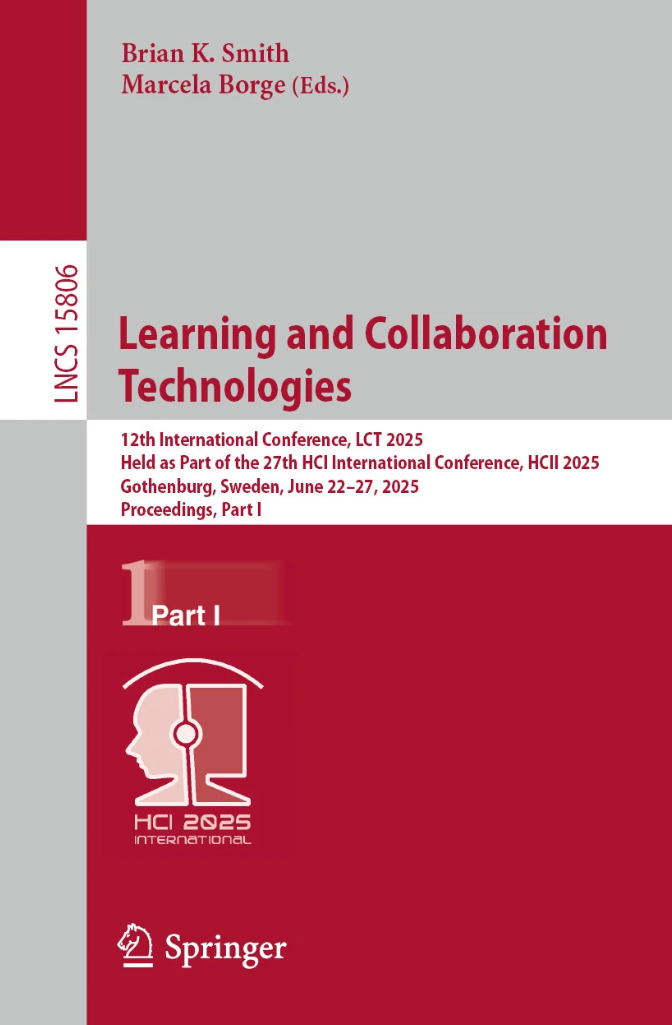 Authors: Elis Kakoulli Constantinou, María Victoria Soulé, Stavroulla Hadjiconstantinou and Nicoletta Pantela , CUT
Authors: Elis Kakoulli Constantinou, María Victoria Soulé, Stavroulla Hadjiconstantinou and Nicoletta Pantela , CUTPages: 225-244
Title: Evaluating the Transformative Digital Pedagogies for Higher Education Training Programme: Insights into Participants’ Perceptions
Conference: 12th International Conference, LCT 2025, Held as Part of the 27th HCI International Conference, HCII 2025,
Date: June 22–27, 2025 Gothenburg, Sweden
Link: https://doi.org/10.1007/978-3-031-93564-0_14
Article: https://doi.org/10.1007/978-3-031-93564-0_14
The adaptation of education and training systems to the digital age is one of the priorities of the European Commission. Aiming at promoting high-quality, inclusive education, Higher Education (HE) institutions are working towards digital and pedagogical transformation; however, lack of both pedagogical skills for using digital technologies and digital skills for implementing innovative teaching practices make this a challenging task. The Erasmus+ funded Transformative Digital Pedagogies for Higher Education (TDP4HE) project addresses this challenge by developing a training programme for HE staff designed to enhance academic staff’s pedagogical and digital competencies, enabling them to effectively transition to digital education. This paper examines the first implementation and evaluation of this online training programme, delivered to EUt + university staff in May-June 2024. The results show participants’ positive perceptions about the training programme’s innovative approach to transformative digital pedagogies. They also identify certain challenges encountered and reveal ways in which the training programme could be improved to better meet educators’ needs.
Digital Pedagogies for Higher Education: The Design of an Online Training Programme for Academic Staff
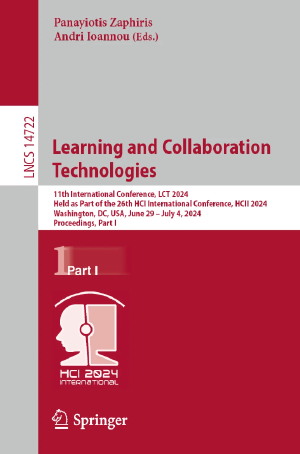 Authors: María Victoria Soulé & Elis Kakoulli Constantinou, CUT
Authors: María Victoria Soulé & Elis Kakoulli Constantinou, CUTPages: 91-102
Title: Digital Pedagogies for Higher Education: The Design of an Online Training Programme for Academic Staff
Conference: 26th International Conference On Human-Computer Interaction
Date: 29 June - 4 July 2024, Washington, USA, online.
Link: https://2024.hci.
Article: https://doi.org/10.1007/978-3-
This paper explores the design of an online training programme within the Transformative Digital Pedagogies for Higher Education (TDP4HE) Erasmus+ KA2 project, aiming to empower academic staff with competences for transformative digital pedagogies. The programme addresses three core priorities: fortifying academic readiness for digital education, fostering innovation in learning and teaching, and recognising excellence in education.
Grounded in the UN’s 2030 Sustainable Development Goals and responding to challenges highlighted by the COVID-19 pandemic, the TDP4HE project integrates transformative pedagogies, primarily learner-centric approaches, with digital technologies. The online training programme, developed with a needs analysis from the European University of Technology (EUt+), includes a self-assessment framework, learner-centred curriculum design, and a delivery mode involving webinars for wider academic consumption.
The TDP4HE project envisions a digitally adept, student- centred, resilient, and innovative higher education landscape, aligned with global aspirations for quality education.
16th annual International Conference of Education, Research and Innovation, Seville (Spain)
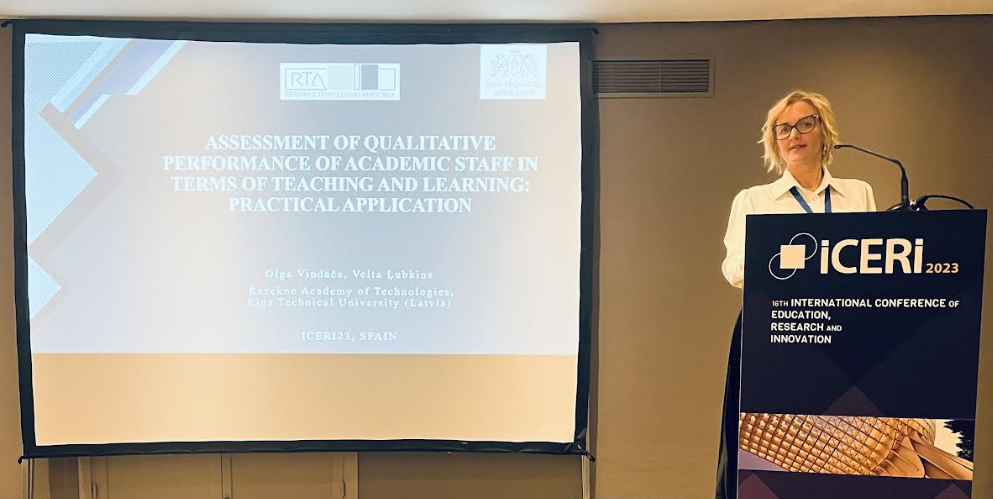 Date: 13th - 15th of November, 2023
Date: 13th - 15th of November, 2023The participation in the 16th annual International Conference of Education, Research and Innovation, Seville (Spain) had the privilege to present the article “ASSESSMENT OF QUALITATIVE PERFORMANCE OF ACADEMIC STAFF IN TERMS OF TEACHING AND LEARNING: PRACTICAL APPLICATION” reflecting the practical application of the developed theoretical framework for the assessment of pedagogical competence of academic staff. The conference provided a dynamic platform for exchanging ideas and insights with fellow researchers, practitioners, and field experts.
Link of materials: https://doi.org/10.21125/iceri.2023.1054
Assessment of Pedagogical Competence of Academic Staff: Case Study
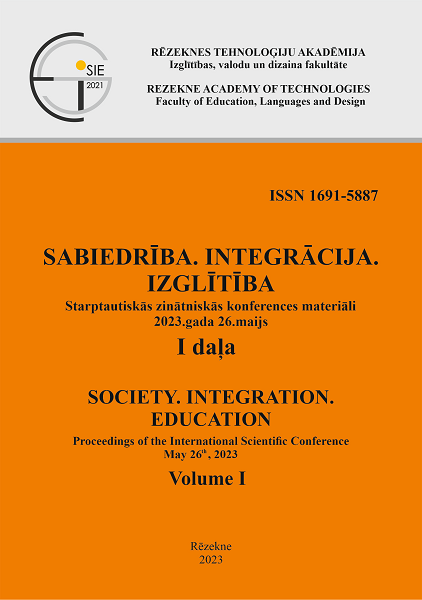 Authors: Olga Vindača Rezekne Academy of Technologies, Riga Technical University
Authors: Olga Vindača Rezekne Academy of Technologies, Riga Technical UniversityTitle: Assessment of Pedagogical Competence of Academic Staff: Case Study.
Conference: // 17th International Scientific Conference Society. Integration. Education – SIE2023 Proceedings.
Date: 26-27 may, 2023, Rezekne, Latvia.
Link: https://doi.org/10.17770/sie2023vol1.7151 (offered for Web of Science), ISSN 1691-5887.
Article: https://journals.rta.lv/index.php/SIE/article/view/7151/6085
Key words: academic staff, assessment, higher education, non-teacher trained academic staff, pedagogical competence, teacher-trained academic staff
The article reviews the issue of pedagogical competence of academic staff (PCAS) in higher education institutions focusing on the primary tenants of its formation and development, offering the definition of PCAS, emphasizing non-teacher trained academic staff (without pedagogical background). As well as contributing to the discussion of PCAS among the experts and professionals of non-pedagogical field, formulating the core elements for the assessment of PCAS in three perspectives: of educators, of students, of higher education institution.
This study will help higher education institutions to rethink their strategies for the assessment of academic staff and further perspectives of their development planning.
Assessment of Pedagogical Competence of Academic Staff: Criteria and Indicators
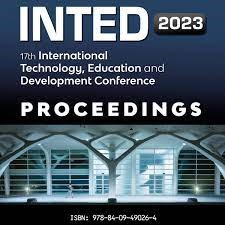 Authors : Olga Vindača, Rezekne Academy of Technologies (LATVIA), Professor Velta Ļubkina, Riga Technical University, Rezekne Academy of Technologies (LATVIA) (2023).
Authors : Olga Vindača, Rezekne Academy of Technologies (LATVIA), Professor Velta Ļubkina, Riga Technical University, Rezekne Academy of Technologies (LATVIA) (2023).Title: Assessment of Pedagogical Competence of Academic Staff: Criteria and Indicators.
Conference: 17th International Technology, Education and Development Conference (INTED2023)
Date: 6th-8th March, 2023, Valencia, Spain,
Link: doi: 10.21125/inted.2023.0401 (offered for Web of Science).
Appears in: INTED2023 Proceedings
Publication year: 2023
Pages: 1385-1394
ISBN: 978-84-09-49026-4
ISSN: 2340-1079
Appears in: INTED2023 Proceedings
Keywords: Pedagogical competence, academic staff, teaching, learning, research, innovation, digitalization
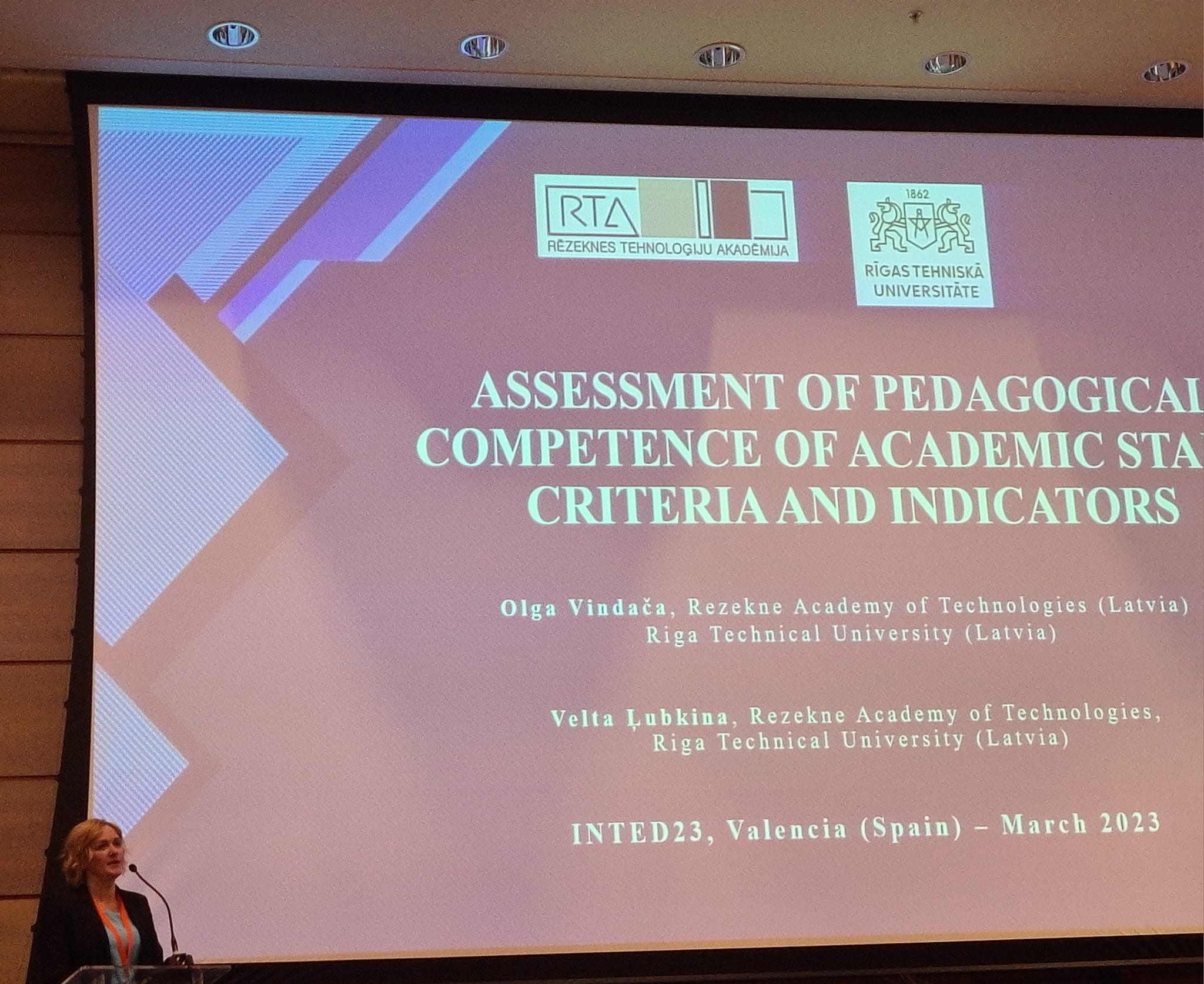
Abstract:
As it is emphasized in the updated European strategy for universities 2022 the higher education institutions have a unique position at the crossroads of teaching, learning, research and innovation, serving society and economy. Therefore, the academic staff needs to be equipped with the corresponding skills and competence for the future in order to meet innovative and technological potential, ensuring scientific excellence. The aim of this article to explain the formation of each group of pedagogical competence: learning-assessment; research-innovative and digital; to specify the key criteria and indicators for each group of pedagogical competence, providing a selective review of research, and to justify the structure of assessment process of pedagogical competence of academic staff, combining self-assessment and students’ assessment tools.
Acknowledgment:
This article is created within the project “Strengthening the Academic Staff of Higher Education Institutions in the areas of strategic specialization in RTA, VeA and ViA” (8.2.2.0/20/I/005) and RTU ERASMUS+ project Transformative Digital Pedagogies for Higher Education TDP4HE (Nr. 2022-1-LV01-KA220-HED-000085277).
Date of update 24 October 2025


